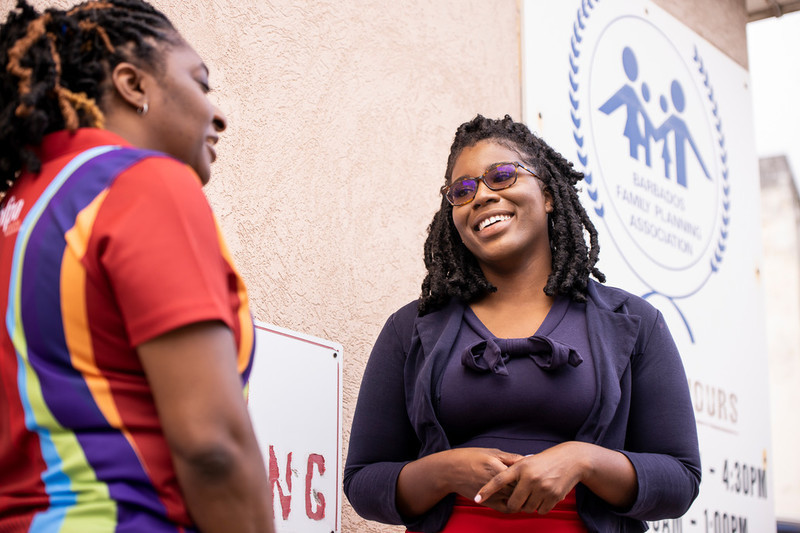

| 14 April 2024
March News Round-Up
IPPF ACRO participates in the C20 Conception Meeting in Brazil. Kamilah Morain, Director of Member Association Support and Development at ACRO, participated in the inaugural meeting of the C20 Engagement Group in Recife, Brazil. This group plans and proposes policies for the upcoming G20 forum, which will take place in November 2024, focusing on issues such as health and education. As the co-facilitator of the Women's Rights and Gender Equality working group, she will, on behalf of IPPF ACRO, seek to ensure that the voices of women and girls are heard by the G20 leaders. This is crucial because the G20 represents a large portion of the global economy and trade. Profamilia ready to host the Seventh International Conference on Family Planning in November 2025. For the first time in history, the International Conference on Family Planning (ICFP) will be held in Latin America, and Profamilia Colombia will be a co-host! Alongside the William H. Gates Sr. Institute for Reproductive Health and Population and the Government of Colombia and the Valle del Lili Foundation, Profamilia will welcome thousands of family planning professionals from November 3rd to 6th, 2025, in Colombia. The ICFP serves as a gathering point for governments, institutions, researchers, activists, and professionals seeking to promote collaboration and innovation in sexual and reproductive health. On this occasion, Colombia has been chosen as the venue due to the government's commitment and the efforts of social movements that have resulted in significant advances in access to sexual and reproductive health for Colombian people. See you there! Gestos succeeds in canceling the HIV and other STI testing requirement in the city of Lagoa do Carro, Brazil. Thanks to a complaint from Gestos' legal team, and in collaboration with Caop Cidadania and the Public Ministry of Carpina, the municipal government of Lagoa do Carro canceled the requirement to undergo HIV, Syphilis, and Hepatitis B and C testing in its contests. This significant victory for human rights and the advancement of sexual and reproductive health is a reminder that demanding STI test results is a discriminatory practice that violates human rights. Furthermore, in Brazil, the right to confidentiality is guaranteed by law. Congratulations to the Gestos team for their hard work in guaranteeing the rights of people living with HIV! Kamala Harris visits a Planned Parenthood clinic and becomes the first Vice President of the United States to visit an abortion clinic. The sixth stop on Vice President Kamala Harris's "Fighting for Reproductive Freedom" Tour was a Planned Parenthood abortion clinic. It has been a great opportunity for the Vice President to see the great work that Planned Parenthood does every day to provide sexual and reproductive health care, including safe abortion. In the months leading up to the presidential elections, she has positioned herself as an advocate for access to abortion in a complicated context following the Supreme Court's recent decisions on this issue. "It is right and just that people have access to the health care they need," Kamala Harris said at a press conference. If you want to receive SRHR news directly from the ground to your inbox, subscribe to our newsletter "Rising the Tide". Subscribe

| 07 June 2022
CSE: the pending task in Peruvian schools for INPPARES
Blog by Irma Ramos Executive Director of INPPARES featured in El Comercio Comprehensive Sexuality Education (CSE) plays an essential role in the health and well-being of all people. Having CSE in schools will provide children and adolescents with an education based on the promotion, protection and exercise of their human rights. Despite the efforts and implementation of strategies by various state agencies, there is no significant decrease in adolescent pregnancy. During the two years of confinement, we have presented cases of sexual violence and forced unions, especially in adolescents who required counselling on their sexual and reproductive health. In 2020 alone, the most critical year of the pandemic in Peru, 1,158 adolescents under the age of 15 became mothers, according to INEI. The Demographic and Family Health Survey (Endes, 2021) reveals that, of the 8.9 per cent of pregnancies registered in women aged 15-19, only 33.6 per cent completed primary school. The same source indicates that 6.9 per cent of women aged 15-49 have suffered physical violence by their husband or partner in the last 12 months and, of this figure, 1.8 per cent admit to having been sexually abused by their partner. Furthermore, in 2021, 146 femicides and 123 attempted femicides were perpetrated, according to the Ombudsman's Office. This is why, if we empower women from a young age with education, support and access to services so that they can exercise their sexual and reproductive rights, we will advance in the construction of gender equality with a rights-based approach. The Comprehensive Sex Education Guidelines for Regular Basic Education (RVM-169-2021-MINEDU) were approved almost a year ago. From Inppares, we have promoted the first network of CSE advocate teachers at national level, in order to contribute through them to the empowerment of students, collaborating in their self-knowledge, self-care, relationships and sexuality; helping them to cope in a world where violence, gender-based inequalities, unplanned teenage pregnancies, HIV and other sexually transmitted infections (STIs) continue to pose serious risks to their health and wellbeing. As civil society, we regret that children and adolescents continue to be recurrent victims of various forms of violence. The experiences they go through are harrowing and in most cases are faced alone. It affects them physically, psychologically and socially and, for the most part, prevents them from fulfilling their dreams and life projects. With regard to the legal framework, we are lagging behind in comparison with other countries in the region. In Latin America, six countries have laws that promote Comprehensive Sexuality Education (Mexico, Colombia, Argentina, Ecuador, Nicaragua and Uruguay). Meanwhile, in our country, achieving a norm with the status of law seems to be getting further and further away with initiatives such as the recent bill 904-2021-CR, which seeks to allow certain groups of parents' associations to supervise educational texts and materials without having the technical and pedagogical requirements to carry out such an important task. It is due to this ungrateful reality that we advocate for gender equality, healthy relationships, healthy sexual behaviour and the prevention of sexually transmitted infections from a positive, scientific, educational perspective, promoting a culture of prevention and emphasising values such as respect, inclusion, non-discrimination, equality, empathy, responsibility and reciprocity. From civil society, we advocate politically and publicly in favour of CSE, through alliances and constant dialogue with stakeholders, authorities, organisations, journalists, teachers and adolescents and young people, with the aim of influencing public policies, promoting the sexual and reproductive well-being of people living in Peru, as well as the free exercise of their rights. Irma Ramos Executive Director of Inppares














